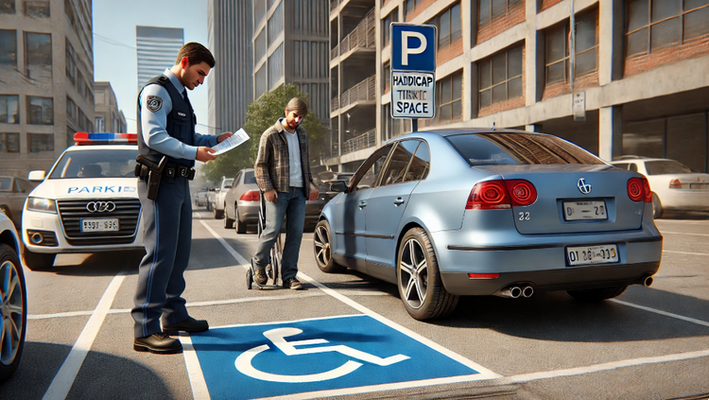
Parking in Disabled Spots - The Real Consequences
Understanding the Importance of Reserved Parking Spaces for Disabled Individuals
Disabled parking spaces are designed to provide accessibility and ease of transportation for people with disabilities. These spaces are strategically located near entrances of businesses, public buildings, and other facilities to ensure that individuals with mobility impairments can access services without unnecessary physical strain.
However, misuse of these parking spots by individuals who do not have a valid disabled parking placard has become a widespread issue. This behavior not only violates laws but also creates significant inconveniences for those who genuinely need these spaces.
In this comprehensive article, we will explore the real consequences of parking in a disabled spot without a valid placard, the ethical implications, legal penalties, and how individuals who qualify for a disabled permit can obtain one legally through HandicapMD.com.
Legal Consequences of Misusing Disabled Parking Spaces
Parking in a disabled spot without a valid placard or permit is a serious offense, and each state has laws that impose strict penalties. Below are some of the key legal consequences:
1. Fines and Monetary Penalties
Most states impose hefty fines for illegally parking in a disabled spot. Depending on the jurisdiction, these fines can range anywhere from $250 to over $1000 per offense. For example:
In California, fines for parking in a disabled spot without a permit start at $250 and can go up to $1,000.
In New York City, fines start at $180 and can escalate significantly for repeat offenses.
In Florida, offenders can face fines between $250 and $500.
These fines are designed to discourage unauthorized parking and ensure that disabled individuals have unobstructed access to these necessary spaces.
2. Towing and Impound Fees
If a vehicle is found illegally parked in a disabled space, authorities have the right to tow the car. The driver will then have to pay expensive impound fees, which can include:
Towing fee: Ranges from $100 to $300 depending on location.
Daily storage fee: Some impound lots charge $20-$50 per day until the vehicle is retrieved.
Administrative fees: Some jurisdictions charge extra processing fees for vehicles towed from handicap parking spaces.
3. Court Appearances and Additional Legal Ramifications
In some cases, illegally parking in a disabled space may require a court appearance. Repeat offenders may face higher fines, community service requirements, or even a suspension of their driver’s license.
For example, in Texas, multiple offenses could result in a Class C misdemeanor, which stays on the offender’s driving record and leads to further legal consequences.
4. Criminal Charges for Fraudulent Use of Disabled Placards
Some individuals attempt to avoid fines by using a fake or stolen disabled placard. However, this is considered fraud and can result in criminal charges. Many states classify placard fraud as a misdemeanor or felony, depending on the severity of the offense. Penalties may include:
Fines up to $10,000
Jail time (up to 6 months or more in severe cases)
Permanent revocation of driving privileges
Using someone else's valid permit without authorization is also illegal and carries similar penalties.
Ethical and Social Consequences of Parking in Disabled Spots
Beyond the legal implications, parking in a disabled spot without a permit has serious ethical and social consequences.
1. Blocking Access to Those in Need
Disabled parking spaces exist to accommodate people with limited mobility. When someone without a disability takes one of these spaces, they directly impact individuals who rely on these spots for accessibility.
For example, a person using a wheelchair or crutches may have difficulty walking long distances from a regular parking space to a building entrance. Illegally occupying a disabled space forces them to find alternative parking, which may be too far or unsafe.
2. Disregard for Community and Inclusivity
Parking in a disabled spot without a placard shows a lack of consideration for individuals with disabilities. A community that promotes inclusivity and respect for accessibility laws fosters a more accommodating and supportive environment.
3. Public Shaming and Social Stigma
Many cities now use social media and local news outlets to call out offenders who illegally park in disabled spaces. There have been cases where individuals found themselves publicly shamed for their actions, leading to damage to their personal and professional reputations.
How to Legally Obtain a Disabled Parking Placard
If you or a loved one has a medical condition that qualifies for a disabled parking permit, the best course of action is to apply for one legally. The process can often be confusing, but HandicapMD.com simplifies the entire procedure.
1. Who Qualifies for a Disabled Parking Permit?
Individuals with the following conditions may be eligible:
Limited mobility due to neurological, orthopedic, or musculoskeletal conditions
Respiratory conditions that require oxygen therapy
Cardiovascular diseases that significantly impair mobility
Visual impairments (in some states)
Recent surgery or temporary disabilities
2. Steps to Apply for a Handicap Placard Online
HandicapMD.com offers an easy and legal way to obtain a disabled permit online:
Register on the website – Provide basic information about your medical condition.
Consult with a licensed physician via telemedicine – No in-person visits required.
Receive your certified application form – Your doctor will complete and sign the necessary documents.
Submit your application to the DMV – Follow the state-specific instructions for processing.
3. Why Choose HandicapMD.com?
Convenient and Online: No need for in-person visits.
Fast Processing: Get your medical certification quickly.
Trusted and HIPAA Compliant: Your medical information remains confidential.
Expert Doctors: Licensed medical professionals who understand eligibility requirements.
Final Thoughts
Parking in a disabled space without a permit carries serious consequences, including fines, legal penalties, and ethical repercussions. These spaces are meant to ensure that individuals with disabilities can move around safely and efficiently.
If you or someone you know qualifies for a disabled parking permit, take the legal and responsible route by applying through HandicapMD.com. By following the proper procedures, you help create a more inclusive and respectful society while ensuring that those who truly need these spaces have access to them.
.png)





